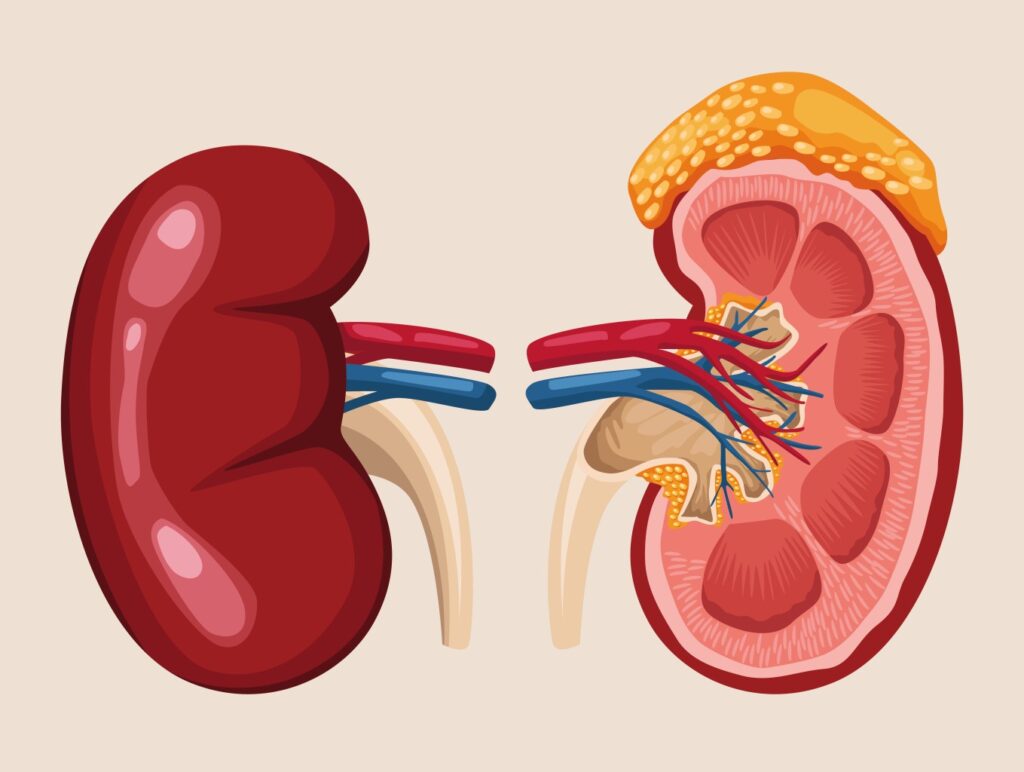
CRF
Chronic Kidney Disease (CKD), also known as chronic renal disease and commonly as kidney failure, is a progressive loss in renal function over a period of months or years. The most common cause is diabetic nephropathy, followed by hypertensive nephroangiosclerosis and various primary and secondary glomerulopathies. Moreover, painkillers play a significant role. Obstructive uropathy due to nephrolithiasis and prostatic hypertrophy is common, while congenital conditions such as polycystic kidney disease (ADPKD) also lead to CKD. The normal glomerular filtration rate (GFR) is approximately 125 ml/min.
STAGE I – When GFR falls below 90 ml/min, it is stage I of chronic kidney disease. There are usually no signs or symptoms at this stage.
STAGE II – When GFR falls to 30-70 ml/min, it is stage II, or chronic renal insufficiency (CRI). The symptoms at this stage are nonspecific and might include a general feeling of being unwell and experiencing a reduced appetite. Often, CRI is diagnosed as a result of screening people known to be at risk of kidney problems, such as those with high blood pressure or diabetes and those with a blood relative with chronic kidney disease (CKD).
STAGE III – Chronic renal failure (CRF) is the progressive destruction of renal mass with irreversible sclerosis and loss of nephrons over a period of at least months to many years, with a progressive decrease of GFR below 30 ml/min. The symptoms typically include worsening kidney function, such as anorexia, nausea, vomiting, oliguria, fatigue, and swelling.
STAGE IV – In end-stage renal disease (ESRD), the GFR declines to levels of less than 10 ml/min, with full-blown signs and symptoms of uremia and fluid overload. It renders the patient permanently dependent upon renal replacement therapy (RRT), i.e., dialysis or transplantation. The incidence of kidney failure in India is about 260 per million population (pmp), out of which 2 undergo hemodialysis (HD), 1 continuous ambulatory peritoneal dialysis (CAPD), and 3 renal transplants (RT), while 254 pmp are left to die every year as they cannot afford the cost of treatment.
Treatment of Kidney Failure in Homeopathy:
Stem cells are present in the bloodstream and almost all organs of the human body. These stem cells are responsible for growth, repair, and regeneration in all organs. Stem cells are of two types:
- Embryonic Stem Cells
- Adult Stem Cells
These adult stem cells are present in the diseased kidneys of a renal failure patient. Constitutional homeopathic medicine selected on the basis of nature, temperament, personality, and individuality is given to the patient. This tailor-made medicine stimulates the adult stem cells, which brings about the repair and regeneration of injured, damaged, diseased, or inactive nephrons, which form the basic functional unit of a kidney. Thus, renal function is improved with proper elimination of creatinine, urea, and other toxic wastes from the body, normalizing urine formation. Consequently, there is a reduction in swelling and decreased dependency on dialysis. Renal transplant can also be avoided. There is no need to inject stem cells into the damaged kidney. Thus, we see that when homeopathy is used at the onset of CKD/CRI/CRF, the disease can be prevented from progressing to ESRD, saving millions in terms of lives and money worldwide. We further observed:
- Indicated homeopathic remedies reduced the number of dialysis sessions needed over time and even stopped in many cases.
- Indicated homeopathic remedies reduced and overcame the complications associated with chronic dialysis therapy.
- Indicated homeopathic remedies were helpful in postponing the urgent need for transplantation in patients waiting for a graft.
- Chronic kidney disease patients on homeopathic treatment showed marked improvement in quality of life.
- Homeopathic drugs are cost-effective and easy to use with no side effects. Renal failure patients develop a variety of psychiatric, neurological, and somatic disorders, and it was easy for the patients to overcome such conditions with constitutional homeopathic treatment.
